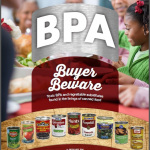
Buyer Beware
Toxic BPA & Regrettable Substitutes in the Linings of Canned Food
Bisphenol A (BPA) is a toxic, endocrine-disrupting chemical that negatively impacts our hormonal systems, contributing to a host of harmful health effects. Hundreds of scientific studies have linked extremely small amounts of BPA, measured in parts per billion and even parts per trillion, to an increased risk of breast and prostate cancer, infertility, type-2 diabetes, obesity, asthma, and behavioral changes including attention deficit disorder. It is likely that people are exposed to BPA from canned foods at levels that are compromising our health.
Downloads
Breast Cancer Fund; Campaign for Healthier Solutions; Clean Production Action; Ecology Center; and Safer Chemicals, Healthy Families’ Mind the Store Campaign (with support from Maryland PIRG and others)

For more information, visit http://www.toxicfoodcans.org/
Bisphenol A (BPA) is a toxic, endocrine-disrupting chemical that negatively impacts our hormonal systems, contributing to a host of harmful health effects. Hundreds of scientific studies have linked extremely small amounts of BPA, measured in parts per billion and even parts per trillion, to an increased risk of breast and prostate cancer, infertility, type-2 diabetes, obesity, asthma, and behavioral changes including attention deficit disorder. It is likely that people are exposed to BPA from canned foods at levels that are compromising our health.
OUR RESEARCH
This investigation consolidates and builds on the evidence presented in previously released reports on BPA in food packaging by performing three important tasks:
- Identify and analyze the interior linings and lids of nearly 200 canned foods, including — for the first time ever — the replacement materials for BPA-based epoxy being used by national brands and retailers, and the extent to which those companies have studied the safety of these materials.
- Present a summary of dozens of can coating types approved for use by the FDA since the agency publicly announced its support for industry action to remove BPA from food packaging in 2010, and show the replacements’ potential health hazards.
- Follow up on the promises made by major national brands and retailers — and survey the policies they have adopted — to gauge their responsiveness to the intensifying public demand for full disclosure of ingredients and safety data on the chemicals in linings of food cans.
OUR GOALS
A collaboration of non-governmental organizations (NGOs) throughout the United States and Canada participated in this product-testing investigation conducted by the Ecology Center. These were our goals:
- Determine to what extent BPA-based epoxy linings are still being used by major national brands and retailers in canned food linings, and whether these companies have policies in place to disclose and/or phase out its continued use.
- Determine the types of substitutes used in “BPA-free” can linings, and to what extent the safety of these substitutes has been studied
- Identify company leaders and laggards in reducing the use of BPA in can linings.
- Generate solutions for moving the market toward informed substitution and safer, non-BPA alternatives for canned food linings.
NGOs collected canned food for testing and also surveyed well-known national food brands, grocery stores and big box retailers. This report analyzed the interior coatings and lids of 192 cans containing vegetables, fruits, soups, broth, gravy, milks and beans. Canned food was collected in 19 U.S. states (see appendix in the full Report) and one Canadian province. The Cans Not Cancer and Mind the Store campaigns, along with Environmental Defence (Canada), also surveyed leading national brands and the largest retailers of canned food to find out what policies they have in place to phase out the use of BPA-based epoxy and to avoid regrettable substitutions.
KEY FINDINGS
Our findings were alarming. We expected that the explosion in consumer demand for BPA-free packaging would have resulted in swifter action by canned food brands and retailers. However, 67 percent of the cans tested (129 out of 192) contained BPA-based epoxy in the body and/or the lid.
Topics
Find Out More


Safe At Home in 2024?

5 steps you can take to protect your privacy now
